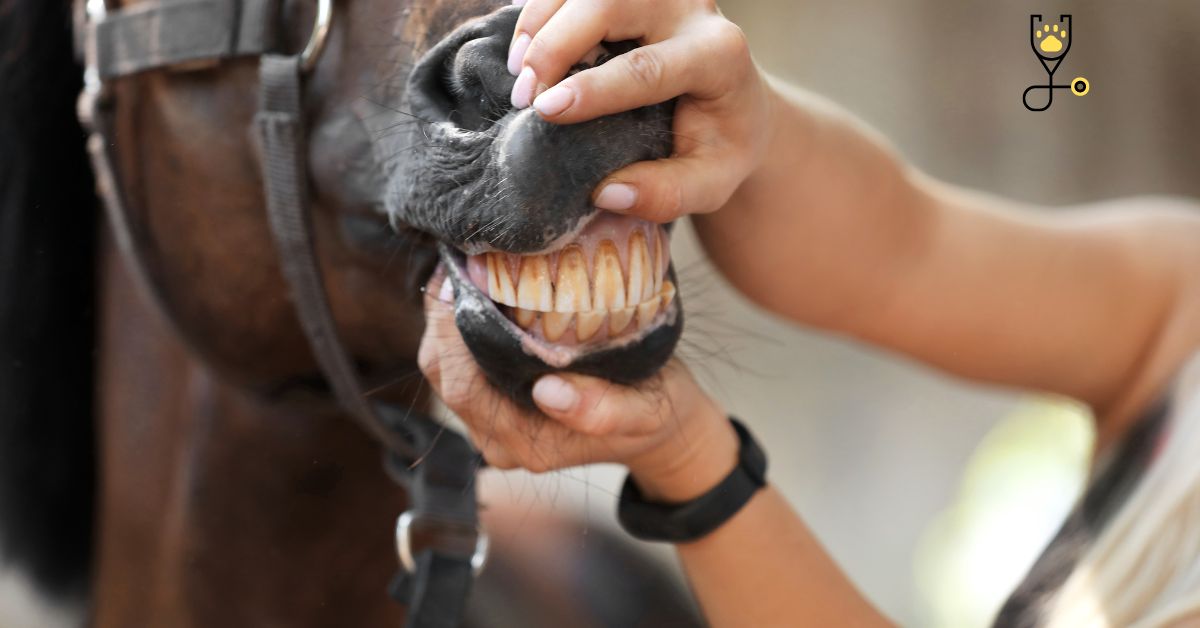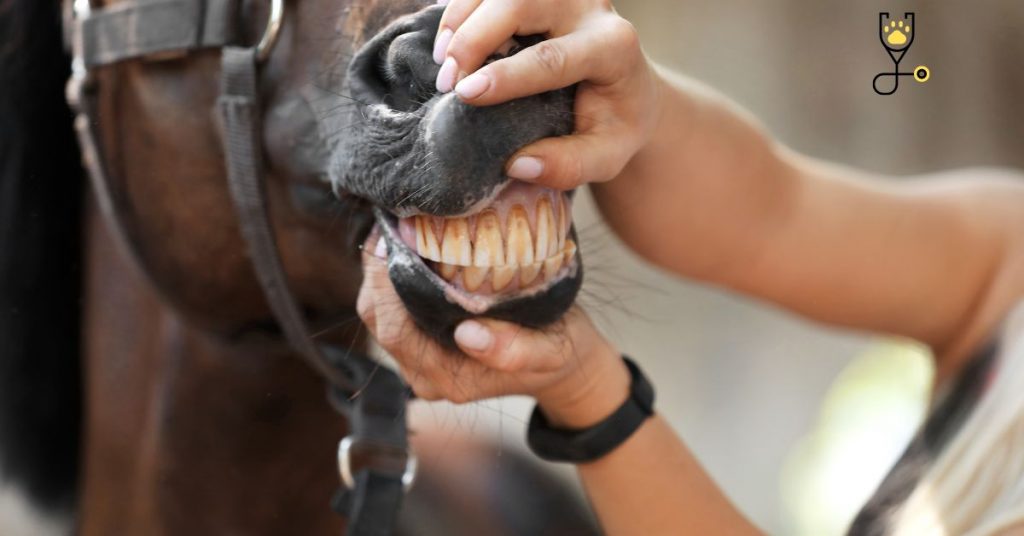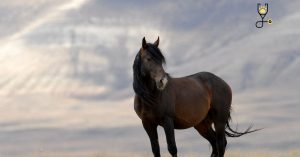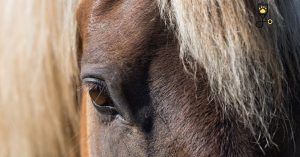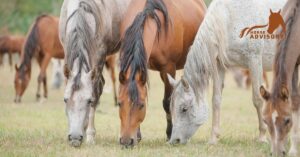There are many ways your horse tells you that it needs its teeth checked. Some horses may be more subtle than others in their behavior, but if you’re observant, you’ll be able to tell when it’s time for a teeth check. In this blog post, we’ll discuss thirteen different signals your horse may exhibit when its teeth need attention. So whether your horse is refusing to eat, constantly grinding its teeth, or has developed a bad habit, keep reading to see if one (or more!) of these signs apply!
1. Refusal to Eat
If your horse suddenly refuses to eat its food or feed, this could be a sign that it needs its teeth checked. This can occur when the horse’s mouth is too sensitive due to a dental issue, making it uncomfortable to eat. In these instances, your veterinarian will likely recommend checking the horse’s teeth and may suggest filing down sharp edges or treating infections present in the mouth.
2. Grinding Teeth
A common sign of dental pain in horses is grinding their teeth together. Horses can grind their teeth due to painful nerve endings within the mouth, caused by issues with the molars or other areas of the jaw. If you notice your horse grinding its teeth for any length of time, it may be an indication that it needs its teeth checked.
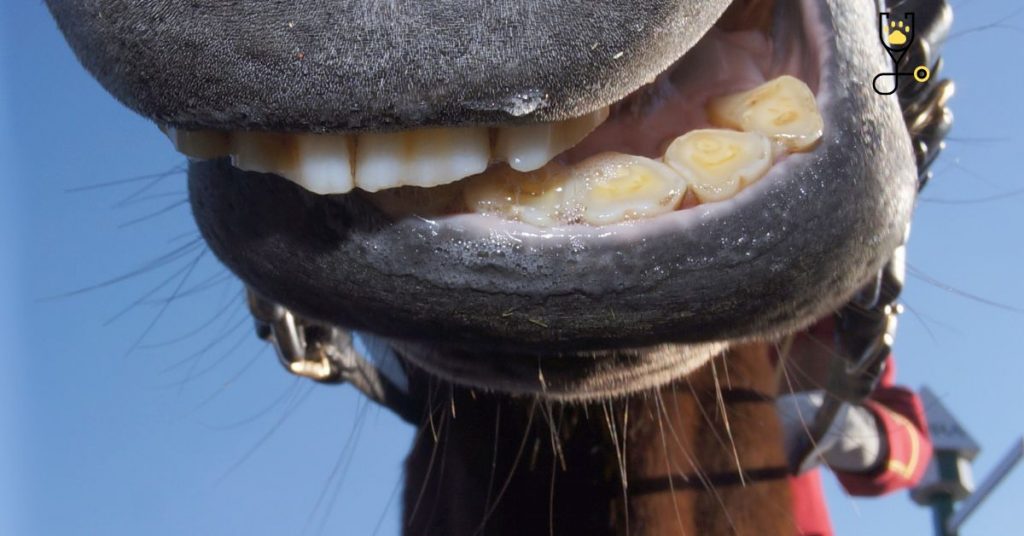
3. Dropping Food from its Mouth
If you notice your horse dropping food from its mouth, this could be a sign of dental pain or discomfort. This can occur when the horse’s teeth are not properly aligned, creating sharp edges and making it difficult to chew. A veterinary dentist will be able to check the alignment of your horse’s teeth and provide treatment if necessary.
4. Bad Habits
Many horses develop bad habits as a result of discomfort in their mouths due to dental issues. These can include excessive biting or head shaking, which can indicate that your horse is experiencing pain in its mouth or jaw area and needs to have its teeth looked at by a professional.
5. Picking Up Objects with Its Teeth
If you’ve noticed your horse has been picking up objects with its teeth, it may be a sign of dental pain or discomfort. This is because the horse is using its teeth to gain leverage and reduce the amount of pressure placed on its jaw area. A veterinary dentist can assess why this behavior is occurring and provide treatment if necessary.
6. Head Tossing or Shaking
If your horse is displaying signs of head tossing or shaking, this could indicate that it is experiencing some form of discomfort in its mouth due to dental issues. This can often happen when the horse’s mouth does not properly align with its skull, causing sharp edges on the teeth that can cause pain. A veterinarian dentist can assess the issue and provide treatment if necessary.
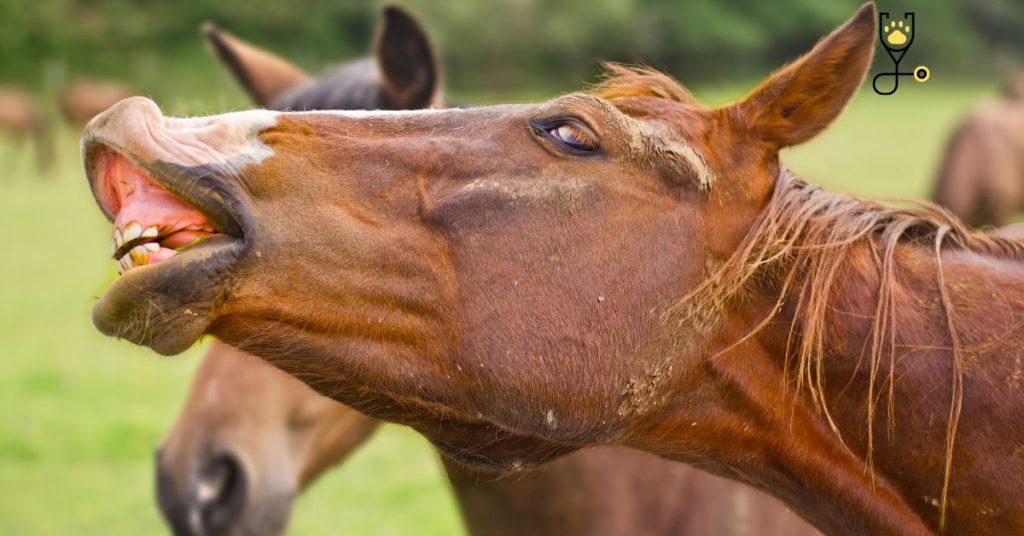
7. Quidding (or Dropping) Hay and Grain
Quidding is when a horse drops hay or grain from its mouth while eating. This behavior could be due to dental discomfort, as the sharp edges created by misaligned teeth make it difficult for the horse to chew properly. In these cases, a veterinary dentist should check your horse’s teeth to identify any issues that may need treating.
8. Unusual Chewing Patterns
If you have noticed your horse chewing in an unusual pattern, this could be indicative of dental pain or discomfort. Horses who experience discomfort in their mouth may move their jaw around in an attempt to find relief from the pain, resulting in them chewing in an abnormal pattern. A veterinary dentist should be able to assess why this is happening and provide appropriate treatment.
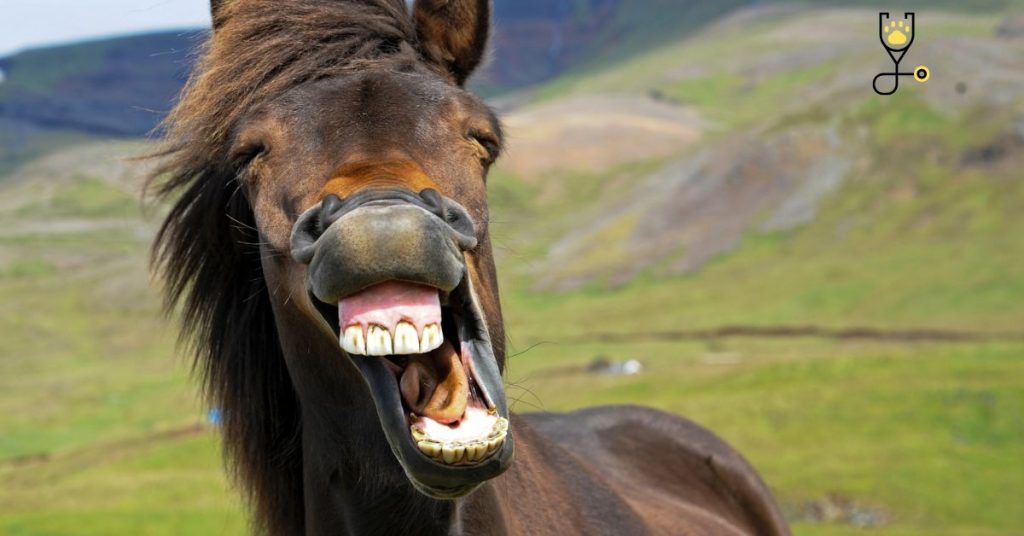
9. Excessive Salivation
If your horse is producing more saliva than usual, this could be a sign of dental pain or discomfort. This can occur when the horse’s mouth is too sensitive due to sharp edges on the teeth or other areas of the jaw, resulting in increased salivation as a response to the discomfort.
10. Unusual Bad Breath
Bad breath can often indicate that something isn’t right with your horse’s oral health, so if you notice any unusual bad breath it may be time for a check-up by your vet. This can be caused by bacterial infections within the mouth due to poor dental hygiene or other issues such as misaligned teeth, which can cause discomfort and bad breath. A veterinary dentist should be able to diagnose any underlying issues affecting your horse’s oral health. Being aware of these signs of dental pain in horses can help you identify any problems sooner, increasing the chances of a successful resolution. If you suspect that your horse may have an issue with its teeth, it is important to contact a veterinarian dentist without delay who can assess the situation and provide treatment if necessary.
11. Weight Loss
If your horse is suffering from dental pain, it may stop eating properly and subsequently lose weight. This can be a sign that the teeth are causing discomfort when chewing, leading to reduced food intake and nutritional deficiencies. A veterinary dentist should check your horse’s mouth for any problems and provide treatment if necessary.
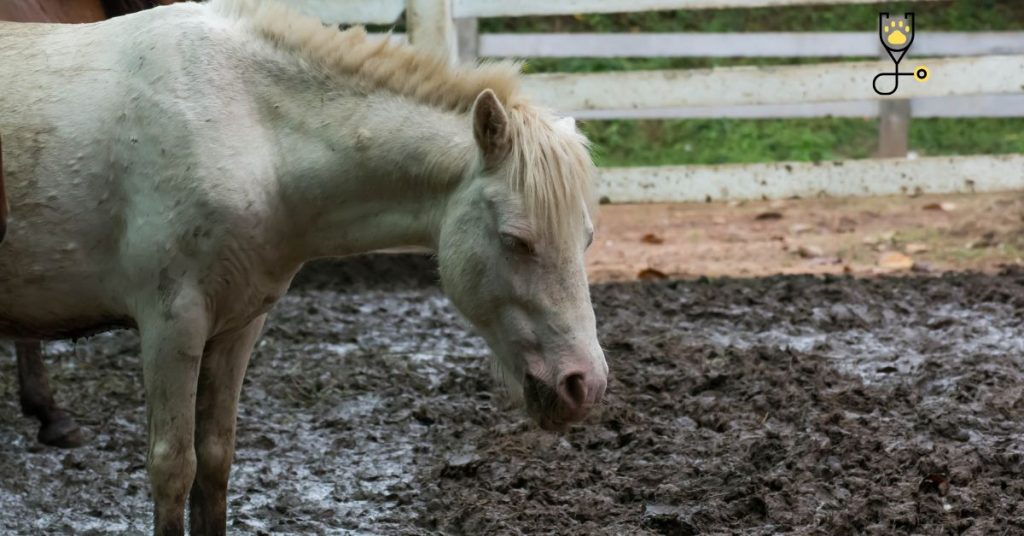
12. Increased Aggression
Discomfort in the jaw area caused by misaligned teeth can lead to increased aggression in horses. If you have noticed changes in your horse’s behavior that cannot be explained by other factors, it is important to have its teeth checked by a professional as this could be an indication of dental issues which require attention.
13. Unusual Behavior During Riding
Unusual behaviors such as head tossing, bucking, or rearing during riding can be a sign that your horse is in pain due to dental issues. If other explanations for these behaviors cannot be found and the issue persists, it is important to contact a veterinarian dentist who can assess the mouth for any problems. With proper diagnosis and treatment, you can help ensure that your horse has a healthy and comfortable mouth, enabling it to enjoy its daily activities with minimal discomfort.
Conclusion
By understanding these signs of dental pain in horses and seeking professional help early when needed, you can make sure that all potential oral health issues are addressed before they become more serious. This will enable your horse to remain as happy and comfortable as possible while getting on with enjoying its life! Remember: dental pain in horses can be prevented with regular checks by a veterinarian dentist, so it’s important to ensure that your horse’s teeth are checked regularly. Just like humans, dental health is just as important for your horse and should never be neglected! With the right care and attention, you can help keep your equine companion healthy and happy. So don’t wait – if you notice any of these signs of dental pain in horses, contact your vet without delay! Happy riding! 🙂
Frequently Ask Questions
1. How often should I have my horse’s teeth checked?
It is recommended that you have your horse’s teeth checked by a veterinarian dentist at least once a year, or more frequently if they show any signs of dental pain or discomfort.
2. What is the best way to prevent dental issues in horses?
The best way to prevent dental issues in horses is with regular check-ups from a veterinarian dentist and proper care and maintenance of your horse’s mouth. This includes feeding them hay and other forages, as well as providing routine tooth brushing with an approved dental paste. Additionally, avoid giving your horse hard treats such as carrots or apples which can be damaging to their teeth over time.
3. What signs should I look out for if my horse has a dental issue?
Signs that your horse may have a dental issue include difficulty chewing, bad breath, reluctance to accept the bit, weight loss, increased aggression, and unusual behavior during riding. If you notice any of these symptoms in your horse it is important to seek advice from a veterinarian dentist without delay. This will enable them to diagnose and treat any issues before they become more serious.
4. Is dental pain in horses treatable?
Yes, dental pain in horses is treatable. However, it is important to diagnose and treat the underlying issue as quickly as possible to ensure that your horse remains comfortable and healthy. If you suspect that your horse has a dental problem or is experiencing any of the signs mentioned above, contact your veterinarian dentist for advice without delay. They will be able to assess the mouth for any issues and provide appropriate treatment if necessary. With proper care and attention, you can help keep your equine companion healthy and happy!
5. Do horses need to have their teeth floated?
Floating is a common dental procedure that may be recommended by your veterinarian dentist if your horse has any existing issues or to prevent future problems. During floating, the edges of the teeth are smoothed and sharp enamel points are removed which can help reduce pain and discomfort for your horse. It also helps maintain proper occlusion (the way the upper and lower jaws fit together) which is important for healthy chewing habits. However, this procedure should only ever be carried out with professional supervision from an experienced equine dentist. So if you’re unsure whether or not your horse needs its teeth floated, it’s best to consult with a veterinarian dentist who can assess their individual needs.
